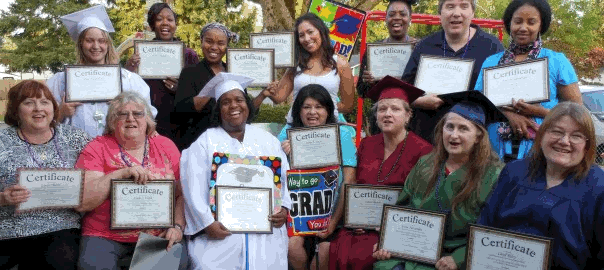
General information
Council for Children and Families Inc. offers basic and advanced early childhood training designed for teachers who work with children ages 0 – 5 years old. Training is suitable for family day care settings as well as day care centers and Head Start. All CFCF training can be used to apply for a new Child Development Associate Credential (CDA) or renew existing CDA. Students outside of Washington State can take correspondence classes. In person classes are only available to Washington State residents living in King, Snohomish and Pierce counties.
All CCF training is approved by the Washington State and Registry System (STARS) to fulfill education requirements (WAC 170-29A-1800). We work with Managed Education and Registry Information Tool (MERIT) to report classes and advance students on career ladders for early care and education professionals. Professionals who currently work in child care facilities licensed or certified by Washington State DEL can receive a cost reimbursement for all CFCF classes.
The high quality of the classes and follow up support is extremely important to us. All classes are written by Tatiana Strachan, president of the Council for Children and Families, Inc. She holds M.Ed. and has over 26 years of experience in teaching and curriculum development. She is also a top level trainer in Department of Early Learning Washington State. The curriculum is updated to include new research as it develops. We strive to make information practical and interesting for all type of learners. All training is part of core competency system as described in Washington State Core Competencies for Early Care and Education Professionals www.del.wa.gov/publications/partnership/docs/CoreCompetencies.pdf.
Cost of classes
Council for Children and Families Inc. charges 13 dollars per hour per person for all classes. Special arrangements can be made for a large group of students. Each student is responsible to make the full payment before each class. Students can pay with a scholarship, if one is available. Council for Children and Families Inc. cannot itself, obtain scholarships for students.
Washington State students only.
All our students who are registered teachers working in licensed early childhood facility in Washington State may be eligible for training reimbursement. Funds vary from year to year and are not always available. To receive reimbursement, the student must have a STARS ID number and use that number to fill out the reimbursement application.
More information about this process can be obtained by contacting Department of Early Learning, P.O. Box 40970, Olympia, WA 98504-0970, 360.725.4665 Toll-free: 1.866.482.4325 360.586.0052 (fax: first floor) 360.725.4925 (fax: second floor) or E-mail http://www.del.wa.gov/requirements/professional/financial.aspx.
Types of the early childhood classes.
Students can choose between Correspondence classes and In-person classes.
Correspondence Classes
Students will receive training materials through mail or E-mail to study at home at their convenience. They will have to do homework and pass a test to receive certificate. Students can contact CCF as many times as necessary to ask questions and receive assistance. For students with limited computer access all contact will be through mail and phone.
Presently we have following 10-hour correspondence training available:
- Science for very young children. STEM education.
- Adverse Childhood Experiences (ACE) and what every early childhood teacher must do.
- How to be safe around dogs. Safety precautions and safe behaviour techniques for children.
- Introduction to making and using hand puppets.
1.Science for very young children. STEM education.
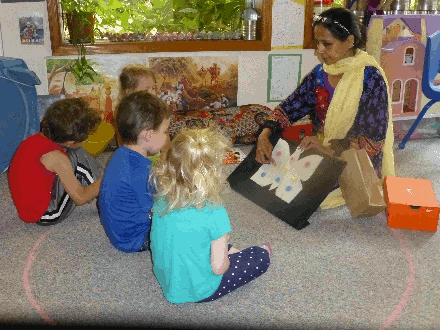
10-hours advanced class. Content area: Curriculum and learning environment. Level 4
Many caregivers want to teach science to very young children, but they do not know how. The class is designed to help teachers have confidence in developing a science curriculum, customized to their children and available resources. Students will learn about early S.T.E.M. education in general and about science learning in particular. They will practice effective strategies that promote inquiry and discovery approaches to learning from infancy to preschool. Training will address intentional, careful planning of the environment, preparing focused learning experiences, extending children’s play, and creating an integrated science curriculum.
2.Adverse Childhood Experiences (ACEs)
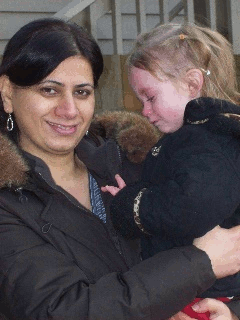
10-hour advance class. Adverse Childhood Experiences (ACE) and what every early childhood teacher must do.
Content area: Professional Development and Leadership Level 3
Adverse Childhood Experience (ACEs) effects people all their lives. People with ACEs experience toxic stress that can change brain development and affect how the body responds to stress. ACEs are linked to chronic health problems, mental illness, and substance misuse in adulthood. Training summarizes the newest and one of the largest investigations ever conducted, to assess association between early childhood maltreatment and its devastating effects on later-life health and well-being. It names ways childhood teachers can use to lessen effects of Adverse Childhood Experiences (ACE) and help young children develop resilience.
3. How to be safe around dogs. Safety prcautions and safe behavior techniques for children.
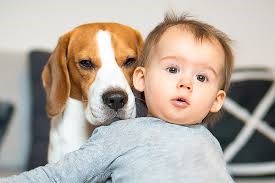
10-hours advanced class. Content area: Safety. Level 2
We live in the urban society full of dogs and cats that represent to many people only animal connection they enjoy. It is extremaly important to keep those animal-human interaction safe and positive. All dogs can bite. Dog bites, especially to young children, are dramatic and can have severe consequence. Class, “How to be safe around dogs.” makes teaching about bite prevention easy and fun. You will learn how to teach children correct way to interact with dogs and avoid types of human behaviour that will provoke dogs to bite. Class is full of practical techniques on meeting strange dogs and playing with home pets in the way that teach emphaty and responsibility. As a bonuse you will learn how to speak dog’s language and will be able to have your first conversation with in a week from receiving certificate of completion.
4. Introduction to making and using hand puppets.
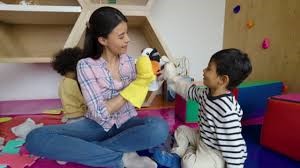
10-hours advanced class. Content area: Curriculum and Learning Environment. Level 2
Hand puppets are the best for a beginning puppeteer. They are the most natural and direct to use and are the easiest to construct. The puppeteer can express himself directly throw the hand puppet without having to overcome the complex problems of control by rods or strings. Class will show you how to make basic type of hand puppets, how to dress them and how to handle them to make them come alive. New puppeteer will not need special talents and with practice he will be able to use new puppets for the benefit of children in school, Christian ministry or at home.
In-person classes
In-person classes are held in private homes or day care centers in different locations in King, Snohomish and Pierce counties. Students can request classes at their location. Classes can be customized. Five students minimum required for 10 hours. Discounts for groups of more than 10 students.
In-person classes are usually delivered in the following ways:
1. One Saturday 10-hour class. (6 hours in person + 4 hours homework)
2. Two Saturdays 10-hour class (5 hours and 5 hours)
3. Weekdays. (2.5 hours each evening)
However, duration of all classes can be adjusted according to group training needs. Day care directors can choose any of the proposed training or combination of shorter classes.
Presently we have following 10 hour in-person classes available:
- Safety precautions and safety rules for children. How to be safe around dogs.
- Adverse Childhood Experiences (ACE) and what every early childhood teacher must do.
- S.T.E.M. education series. Class #1. How to teach science to very young.
- S.T.E.M. education series. Class #2. Using art of puppetry to teach early math.
- Working with modern children series. Class # 1. Teaching social/emotional skills. Frendship skills.
- Working with modern children series. Class # 2. Developing executive function in children by using puppets and creative dramatics.
- Working with modern children series. Class # 3. Making and using hand puppet as a new, effective teaching technique .
1.Safety precautions and safety rules for children. How to be safe around dogs.
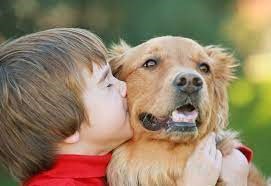
Class description:
We live in the urban society full of dogs and cats that represent to many people only animal connection they enjoy. It is extremaly important to keep those animal-human interaction safe and positive. All dogs can bite. Dog bites, especially to young children, are dramatic and can have severe consequence. Class, “How to be safe around dogs.” makes teaching about bite prevention easy and fun. Studens will learn how to make that important subject a part of everyday curriculum or special bite prevention week. Class comes with tons of free additions on like classroom demonstrations of teaching techniques, workshop for parents, therapy dog visits, science curriculum on dogs, classroom resources.
During this training, students will learn about:
- Why dogs bite?
- Consequences of dog bite.
- How to teach children to be safe around dogs they know.
- How to teach children to be safe around strange dogs.
- Understanding language of dogs.
2.Adverse Childhood Experiences (ACE) and what every early childhood teacher must do.
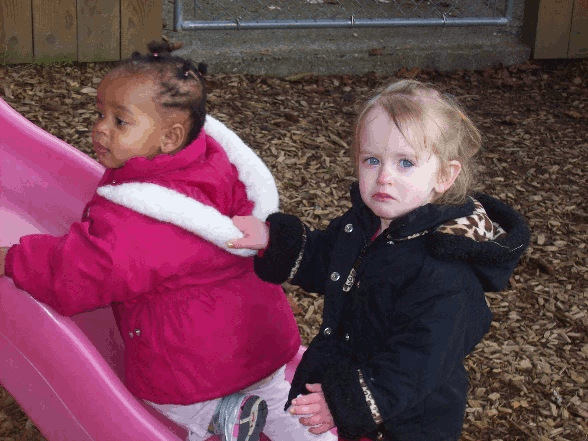
Class description
Adverse Childhood Experience (ACEs) effects people all their lives. People with ACEs experience toxic stress that can change brain development and affect how the body responds to stress. ACEs are linked to chronic health problems, mental illness, and substance misuse in adulthood. Training summarizes the newest and one of the largest investigations ever conducted, to assess association between early childhood maltreatment and its devastating effects on later-life health and well-being. It names ways childhood teachers can use to lessen effects of Adverse Childhood Experiences (ACE) and help young children develop resilience.
During this training, students will learn about:
- New brain science
- How early childhood experiences shape people’s lives
- What can be done to promote resilience?
3. S.T.E.M. education series. Class # 1. How to teach science to very young.
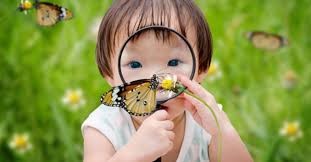
Class description
It is the first part of classes explaining a new trend to incorporate S.T.E.M. education in early childhood classrooms. Students will learn about early S.T.E.M. education in general and about science learning in particular. They will practice effective strategies that promote inquiry/discovery approaches to learning from infancy to preschool. Training will address intentional, careful planning of the environment, preparing focused learning experiences, extending children’s play, and creating an integrated science curriculum. Most importantly, training will also show how teaching science to very young children can be exciting and fun and not as difficult as everybody thought it to be.
During this training, students will learn about:
- S.T.E.M. education in early classroom
- How early science enhances brain development
- Learning science for infants and toddlers
- Wrong approaches to early childhood science
- Early childhood science areas
- Teacher’s role and how to get science materials for free
- Steps in science activities
4. S.T.E.M. education series. Class #2. Using art of puppetry to teach early math.
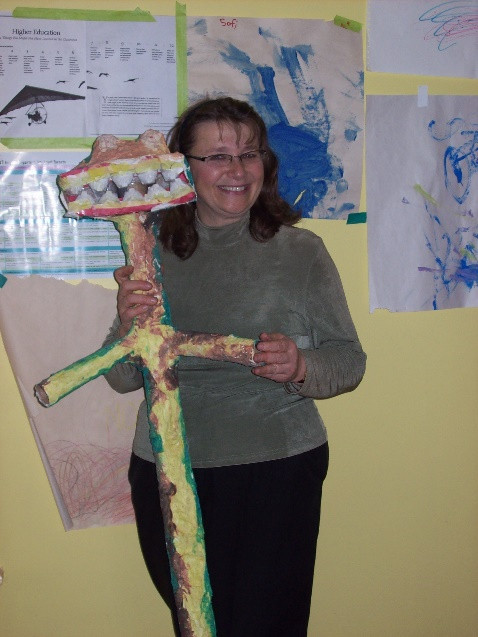
Class description
Puppets are exciting and extremely valuable teaching tools and should never be overlooked in early childhood environment. Teacher can easily make math puppets from cheap, recyclable materials. Class teaches how to effectively make and use puppets as an alternative learning experience in helping children understand early mathematical concepts.
During that training, students will explore:
- S.T.E.A.M. education in early classroom
- Essential mathematical concepts for young children
- Benefits of creative puppetry for children and teachers
- Patterns and ideas for making and using math puppets
5. Working with modern children series. Class #1 Teaching social/emotional skills. Friendship skills
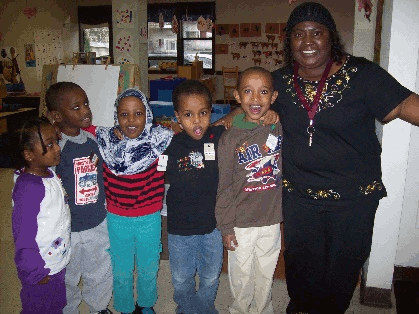
Class description
Generation Alpha,(children born between 2010 and 2024) are predicted to grow up to be highly technologicaly connected but totaly lacking in social/emotional skills. Previous generation, Generation Z is experiencing record-high levels of loneliness, with 73% reporting that they feel alone sometimes or always. We can not let that happen to moder children in our care. We must commit outselves to developing frendship skills, enhancing emotional literacy, teaching how to controlanger and impulses and developing problem solving skills.
During this training, students will learn about:
- What are social/emotional skills to teach modern children.
- Connecting friendship skills to other areas of social-emotional development
- Teaching children friendship techniques
- How to inhance children’s emotional vocabulary.
- Helping children to learn how to control negative emotions.
- Developing problem solving skills in different age children.
6.Working with modern children series. Class # 2. Developing executive function in children by using puppets and creative dramatics.
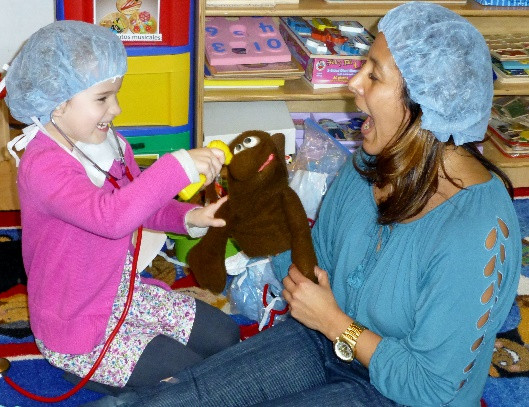
Class description
Generation Alpha is called a great screen age. Modern children belonging to that generation will be independent, visual, technologicaly advanced and divese. They will also have underdevelop Executive Function. Children’s Executive Function skills are foundational for success in educational settings and social situations. In fact, executive function has been a stronger predictor of early academic achievement than IQ. Science predicts that in the future, people will need Executive Function skills to find a job. It is urgent to start developing skill now, in very young children. Class teaches how to develop Executive Function in children. Among many practical teaching techniques we selacted use of puppets and creative dramatic to illustrate how to offer learning through play.
During this training, students will:
- Learn what Executive Function is and why it is important.
- Learn what Executive Function activities are recommended for infants, toddlers, and preschoolers.
- Practice effective techniques of using puppetry and creative dramatics for development of Executive Function in four- and five-year-old children.
7. Working with modern children series. Class # 3. Making and using hand puppet as a new, effective teaching technique.
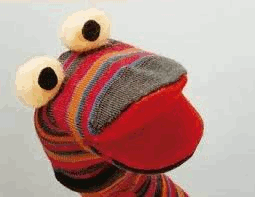
Class description
Modern children will have short attention span and need for hands-on learning. Teachers will have to be very creative and provide fast-paced customised activities with space for movemant. Are you ready for a challange? Effective use of puppets can make amaizing difference. What is even better you can make your own puppets and have exactly what you want for your lessons. Hand puppets are what you need. You can make them for very little money using recycled materials you have at home. They are the most natural and direct to use and are the easiest to construct. The puppeteer can express himself directly throw the hand puppet without having to overcome the complex problems of control by rods or strings. Class will show you how to make basic type of hand puppets, how to dress them and how to handle them to make them come alive. New puppeteer will not need special talents and with practice she will be able to use new puppets for the benefit of children in school, Christian ministry or at home.
During this training, students will:
- Learn how puppets can improve your work with children
- Make hand puppets from different materials.
- Practice making puppet move and talk
- Decide how to effectively use new puppets in their programs.
